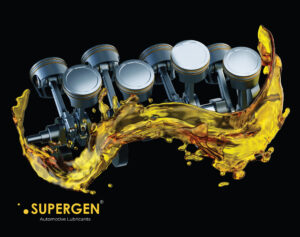When it comes to vehicle protection and performance, the quality of engine oil plays a vital role. Being compliant with the API, ACEA and ILSAC is essential to ensure the best quality of engine oils.
For both everyday drivers and automotive enthusiasts, choosing the right oil isn’t just about brand loyalty—it’s about ensuring a long-lasting engine, reduced maintenance costs, and optimized vehicle performance.
Supergen, a leading name in engine lubricants, stands out by meeting and even exceeding global standards in these areas.
Understanding Global Standards in Engine Oils
Key organizations worldwide, like the American Petroleum Institute (API), European Automobile Manufacturers’ Association (ACEA), and the International Lubricant Standardization and Approval Committee (ILSAC), set benchmarks for engine oil performance and formulation.
Compliance with these standards ensures that the oil can protect engines under various conditions, maintain fuel efficiency, and provide consistent performance.
- API (American Petroleum Institute): One of the most recognized standards in the industry, API categorizes oils based on the type of engines they’re used for (e.g., API SN for gasoline engines).
- ACEA (European Automobile Manufacturers Association): ACEA standards are especially important in Europe, where they test for high-speed durability, fuel economy, and emissions.
- ILSAC (International Lubricant Standardization and Approval Committee): ILSAC focuses on passenger vehicles and targets fuel economy and emissions reductions through oil formulations.
How Supergen Engine Oils Align with API Standards
The American Petroleum Institute’s (API) standards are some of the most stringent in the industry, making them a vital benchmark for automotive oils globally. Supergen’s engine oils are rigorously tested to meet these standards, offering drivers the reassurance that their engines are protected against common issues like sludge buildup, oxidation, and wear.
Supergen’s API Compliance
Supergen oils provide:
- Enhanced Oxidation Stability: Prevents oil from breaking down prematurely, which is essential for prolonged engine health.
- Low-speed Pre-Ignition (LSPI) Protection: A particular concern for turbocharged engines, LSPI can cause severe engine damage. Supergen oils are formulated to reduce this risk significantly.
- High-temperature Protection: Supergen oils maintain their stability and viscosity, even at high temperatures, making them ideal for demanding driving conditions.
ACEA Standards: The European Connection
In Europe, ACEA standards are often regarded as stricter than API, primarily due to different driving styles, fuel types, and regulatory standards.
Supergen’s ACEA Compliant Oils
Supergen offers a variety of oils that comply with ACEA classifications (such as ACEA A3/B4, C3), which makes them suitable for European vehicles and driving conditions. Here’s what this means for vehicle owners:
- Durability: ACEA standards emphasize high-speed durability, meaning Supergen oils maintain their performance at highway speeds and long-distance drives.
- Fuel Efficiency: The ACEA-compliant Supergen oils are formulated for better fuel economy, contributing to cost savings and environmental sustainability.
- Emission Control: European standards are often more stringent on emissions, and Supergen’s ACEA-compliant oils are designed to produce lower emissions, making them an eco-friendly choice.
ILSAC Standards and Fuel Efficiency
The International Lubricant Standardization and Approval Committee (ILSAC) standards focus specifically on passenger cars and mandate engine oils that improve fuel economy and reduce emissions.
Supergen’s ILSAC-Certified Oils
Supergen’s oils meet ILSAC GF-5 and GF-6 standards, which are vital for modern vehicles. Here’s what compliance with these standards means for drivers:
- Better Fuel Economy: The GF-5 and GF-6 standards require engine oils to reduce friction, which translates into better fuel economy.
- Emission Reduction: These standards emphasize reducing emissions, supporting drivers in meeting regional environmental regulations.
- Compatibility with Modern Engines: GF-6 standards specifically cater to newer engine technologies, such as turbocharged engines, offering optimized performance for modern vehicles.
Enhanced Engine Protection with Synthetic Formulations
Advantages of Supergen’s Synthetic Oils
- Superior Wear Protection: Synthetic oils maintain viscosity longer than conventional oils, providing better wear protection over time.
- Improved Thermal Stability: Supergen’s synthetic oils withstand higher temperatures without breaking down, which is essential for protecting engines in hot climates.
- Cold-Start Performance: Synthetic oils flow better at low temperatures, making cold starts easier and reducing engine wear during winter months.
Supergen’s Commitment to Environmental Standards
As environmental concerns continue to grow, engine oil manufacturers are focusing more on eco-friendly formulations. Supergen has taken significant steps to develop oils that not only protect engines but also minimize environmental impact.
Eco-Friendly Features of Supergen Oils
- Low Ash Formulation: Supergen’s low-ash oils help reduce particulate emissions, making them compatible with vehicles equipped with diesel particulate filters (DPFs) and catalytic converters.
- Reduced Sulfur and Phosphorus Content: Sulfur and phosphorus can be harmful to catalytic converters, but Supergen’s oils are formulated with reduced levels of these elements, helping to extend the life of emission-control systems.
- Recyclable Packaging: Supergen uses eco-friendly packaging that’s easy to recycle, helping reduce waste in automotive maintenance.
Supergen’s Research and Development: Exceeding Global Standards
Supergen invests heavily in research and development to stay at the forefront of engine oil technology.
Areas of Focus for Supergen’s R&D Team
- Advanced Additive Technology: Supergen’s R&D team is working on cutting-edge additives that improve lubrication, reduce wear, and enhance performance.
- Compatibility with Hybrid and Electric Engines: Supergen is exploring formulations that meet the needs of hybrid engines, which require oils that cater to frequent stopping and starting.
- Biodegradable Formulations: In line with sustainability goals, Supergen is testing biodegradable oils that reduce environmental impact if leaked or disposed of improperly.
Testing and Quality Assurance
- Oxidation Tests: Ensures the oil won’t break down under high-temperature conditions.
- Shear Stability Tests: Confirms that the oil maintains its viscosity under stress, ensuring consistent protection.
- Deposit Control Tests: Supergen oils are tested to ensure they prevent deposits and sludge formation, keeping engines cleaner and running smoothly.
Real-World Benefits for Drivers and Riders
With Supergen engine oils, you’re not only safeguarding your engine but also gaining other advantages.
- Extended Oil Change Intervals: Thanks to high-quality formulations, Supergen oils maintain their performance longer, meaning you can go longer between oil changes.
- Better Engine Longevity: Reduced friction and cleaner engine internals result in less wear and tear, prolonging engine life.
- Enhanced Performance: Compliant oils deliver optimized fuel economy and power output, helping drivers get the most out of their vehicles.
Summing It Up
In today’s globalized automotive industry, engine oils must adhere to various international standards to provide optimal performance and protection. Supergen’s dedication to meeting and exceeding these standards makes it a top choice for drivers worldwide.
From API and ACEA to ILSAC certifications, Supergen oils are designed to protect engines, boost performance, and support environmental standards, ensuring your vehicle runs smoothly in all conditions.
Whether you’re driving a compact car or a high-performance SUV, choosing Supergen oil means choosing a product trusted by industry standards and tailored for global vehicle requirements.
FAQ’s
- How does changing engine oil affect performance?
Changing engine oil is important as the continuous use of old oil can lead to component failure, energy loss, and poor fuel economy.
- What standards specify the important properties of engine oil?
The SAE (Society of Automotive Engineers) oil standard is a numerical system used to define oil grades by viscosity for low temperatures.
- Does engine oil specification matter?
It is important to use the correct viscosity and API service level that the car manufacturer recommends to ensure optimal engine capacity.
- How to read engine oil specifications?
When it comes to engine oil specifications, keep in mind that the smaller the number, the better it will flow. Knowing this is vital as these oils thicken and thin with fluctuations in temperature.
- What does CF mean in oil?
CF refers to carbon fluoride, a component in many kinds of engine oils. The proportion of carbon fluoride differs depending on the purpose of the oil.








